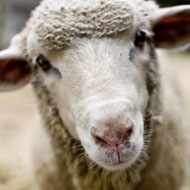Novel blood test for sheep scab

"By using this new test it is now possible to detect the infection much earlier, at the sub-clinical stage."
A novel diagnostic blood test developed for sheep scab infestation is now being carried out by the APHA. Scientists say the test will allow infections to be detected much earlier.
Sheep scab is one of the UK's most significant parasitic sheep diseases, and is a notifiable disease in Scotland.
During the early stages of sheep scab, animals are often asymptomatic. This phase can last several weeks, during which time affected animals can act as a source of infection for other sheep.
Moredun Research Institute, who developed the test, say it is now possible to identify sub-clinical cases, which is essential if control and eradication programmes are to be successful.
Dr Stewart Burgess, who leads the institute's sheep scab research group, said: "The development of a sensitive and specific blood test provides an important tool to aid control strategies for sheep scab and crucially, by using this new test it is now possible to detect the infection much earlier, at the sub-clinical stage."
The test is initially being offered free of charge by the APHA. It works by detecting host antibodies to a specific protein that is only found in the sheep scab mite, Psoroptes ovis.
It is hoped the new blood test will offer a more powerful and reliable diagnosis for sheep scab, when used in conjunction with existing ectoparasitic examinations of skin scrapings currently offered by the APHA.
To make use of this new diagnostic service, veterinary surgeons are asked to submit clotted blood samples and skin scraping samples from the same sheep to APHA's Shrewsbury centre. The vet will then receive the results from the APHA.



 The Animal and Plant Health Agency (APHA) has updated its online reporting service for dead wild birds.
The Animal and Plant Health Agency (APHA) has updated its online reporting service for dead wild birds.